|
|
|
Sort Order |
|
|
|
Items / Page
|
|
|
|
|
|
|
| Srl | Item |
| 1 |
ID:
088375
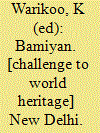

|
|
|
|
|
| Publication |
New Delhi, Third Eye, 2002.
|
| Description |
xx, 252p.
|
| Standard Number |
8186505660
|
|
|
|
|
|
|
|
|
|
|
|
Copies: C:1/I:0,R:0,Q:0
Circulation
| Accession# | Call# | Current Location | Status | Policy | Location |
| 054222 | 726.143/WAR 054222 | Main | On Shelf | General | |
|
|
|
|
| 2 |
ID:
153442
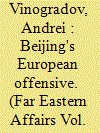

|
|
|
|
|
| Summary/Abstract |
December 11, 2016 marked the 15th anniversary of China becoming a member of the World Trade Organization. According to the Chinese, this date is grounds for automatically granting China the status of a country with a market economy. What has changed in relations between China and the countries of the European Union since that date, and what is behind the European countries' hesitation to grant China this status? How are the results of the referendum in Great Britain influencing relations between China and the European Union? What are the prospects for the European Union and the United States concluding a Transatlantic Partnership trade agreement, and how will China's position in Europe be affected as a result? These questions and others are examined in this work.
|
|
|
|
|
|
|
|
|
|
|
|
|
|
|
|
| 3 |
ID:
192303
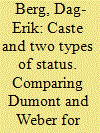

|
|
|
|
|
| Summary/Abstract |
In this article I argue that the concept of status requires more attention in today’s scholarly approach to caste. Caste has become a contested concept which authors define in multiple ways, but the different definitions of status in India’s caste system remain unclear. This article focusses on the two seminal contributions of Louis Dumont and Max Weber. Both have frequently been criticised and dismissed, but this article aims to delineate and compare their different understandings of status. Their contributions have often been judged according to their cultural significance or general concepts of modernity; however, by unpacking their approaches to status, a proper distinction can be made between achieved and attributed status in the study of caste. Thus, revisiting and comparing Dumont’s and Weber’s different concepts of status may create greater clarity when explaining ‘exclusion’ and the evolving caste practices in India and in the diaspora.
|
|
|
|
|
|
|
|
|
|
|
|
|
|
|
|
| 4 |
ID:
158533
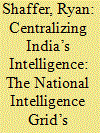

|
|
|
|
|
| Summary/Abstract |
The struggle to ensure information flows to the people who need it while keeping that same information compartmentalized to protect it poses unique problems in the digital age. This effort is further complicated in India where budget constraints, a commitment to democracy, and being a constant target for terrorism tend to severely stretch the security services. In particular, funding for even the country’s Special Forces is problematic and has led to poorly prepared counterterrorism personnel due to limited budgets that prevent the purchase of ammunition for training.
|
|
|
|
|
|
|
|
|
|
|
|
|
|
|
|
| 5 |
ID:
165919
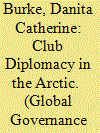

|
|
|
|
|
| Summary/Abstract |
The Arctic Council is frequently called a unique forum but, as this article argues, clubs are common in international politics and in many respects the Arctic Council is a club. This article explores the questions: Why are the Arctic states acting like a club in Arctic politics, and how do internal hierarchies influence how clubs make decisions? As the article illustrates, clubs are the stage for club diplomacy and, in club diplomacy, hierarchies play an important role. Using the Arctic Council as an illustrative case study, this article argues that clubs have internal hierarchies that inform their decision-making processes and their responses to challenges to their status. When clubs try to deal with subjects that extend beyond the boundaries of the sovereignty of club members and the parameters of club membership, club members may suffer from a lack of status and legitimacy to unilaterally deal with the subject.
|
|
|
|
|
|
|
|
|
|
|
|
|
|
|
|
| 6 |
ID:
175553
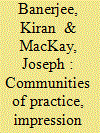

|
|
|
|
|
| Summary/Abstract |
Military attachés and wartime observers have received surprisingly little attention in international relations. Why do states exchange attachés, permitting uniformed foreigners to gather intelligence on their territory and during their wars? To explain, we adopt a broadly practice-theoretic approach, focusing on the individuals who developed the role by living it, showing how they both innovated a distinct military practice and established institutional legitimacy for attachés. We address an early historical case in which the practice proliferated: the Russo-Japanese War, throughout which observers represented multiple European states, on both sides of the conflict. Sometimes termed the first modern war, the conflict saw Japan's entry into the Eurocentric great power system. In this context, embedded attachés had a dual effect. On the one hand, a professional attaché community established itself: we show how local innovation by embedded officers, in the context of this structurally destabilising event, permitted the creation of a new institutional role that might otherwise have been impossible. On the other, the Japanese made use of the attachés as witnesses for Western governments, observing their performance of great power-hood, as they defeated Russia. The argument has implications for understanding both the military attaché system and communities of practice as such.
|
|
|
|
|
|
|
|
|
|
|
|
|
|
|
|
| 7 |
ID:
184666
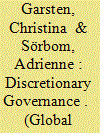

|
|
|
|
|
| Summary/Abstract |
Built on the exclusive funding of 1,000 large transnational corporations, the World Economic Forum is a not-for-profit Swiss foundation, aiming to shape the direction of globalization. Its events are characterized by low degrees of formality and transparency. Research on what this organization does is scarce. This article suggests the term discretionary governance to capture the precarious, yet existing, social order that the organization shapes. By discretionary governance, we mean a set of discreet practices based on the organization’s judgement in ways that escape established democratic controls. Drawing on ethnographic data the paper demonstrates how selection, secrecy, and status form key components of this tenuous ordering. Selection processes and secrecy contribute to status elevation of the individuals and organizations chosen to participate. Upon them and the organization itself is bestowed a symbolic capital that is practical and possibly profitable in the world of global governance.
|
|
|
|
|
|
|
|
|
|
|
|
|
|
|
|
| 8 |
ID:
193605
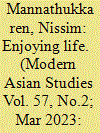

|
|
|
|
|
| Summary/Abstract |
Kerala is a well-recognized ‘model’ of human development in the world. In this article, I look at a crucial aspect of this development, which is often approached in a positivist fashion of statistical aggregation alone: consumption. Instead, there is a need to study the meanings that surround it. I delineate the many forces, particularly the new material infrastructure, that have driven consumption in the last three decades, especially the last one. With increasing integration into global market forces through migration and investment, and cultural imaginations, I show that there is a tectonic change in consciousness about consumption, marked by fantasies, desires, and, contrarily, feelings of excess and ambivalence. I argue that the non-market sector has also played an important role in consumption. There is an increasing generalization of certain ideas about consumption as well as disenchantments across classes. But critically, I contend, there are caste, class, and gender disparities in consumption as well as differences in the meanings attributed to it. Thus, consumption is a socially meaningful, but discrepant, space. This article is based on fieldwork conducted in a town in central Kerala, supplemented with quantitative data.
|
|
|
|
|
|
|
|
|
|
|
|
|
|
|
|
| 9 |
ID:
164367
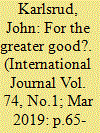

|
|
|
|
|
| Summary/Abstract |
The usual suspects of middle power internationalism—small and middle powers such as Canada, Denmark, Norway, the Netherlands, and Sweden—have all contributed to the UN peacekeeping mission in Mali (MINUSMA). This article argues that while these and other Western countries' contributions to MINUSMA may still be characterized as investments into UN peacekeeping reform and a rule-governed world order, the liberal underpinnings of that commitment are withering. Instead, these countries seek to enhance their own status. This is done by gaining appreciation for their contributions, primarily from the US; strengthening their bids for a non-permanent seat on the UN Security Council; and self-interested contributions to reform UN peacekeeping by efforts to enable it to confront violent extremism and terrorism. Paradoxically, the article concludes, when moving the UN towards counterterrorism and weakening the legitimacy of the organization, Western states undermine a cornerstone of their own security.
|
|
|
|
|
|
|
|
|
|
|
|
|
|
|
|
| 10 |
ID:
178958
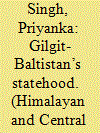

|
|
|
| 11 |
ID:
164821
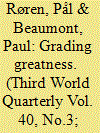

|
|
|
|
|
| Summary/Abstract |
An impressive portfolio of case-study research has now demonstrated how and through what means the BRICS (Brazil, Russia, India, China, South Africa) countries have sought higher social status. However, this field of research lacks systematic means of evaluating this status-seeking. This article fills this lacuna by developing a mixed-methods framework enabling scholars to zoom in and compare individual states’ relative status performance. Using diplomatic representation as a proxy for status recognition and comparing it to a country’s status resources (wealth), the framework indicates how successfully countries have generated recognition from the international society. The findings show that China’s economic ascent has been matched by increased recognition, and that South Africa enjoyed an almost immediate ‘status bounce’ following apartheid, turning it from a pariah to a significant overperformer. Russia should be understood as an ‘overperforming status-dissatisfied power’ while India’s status performance has been around ‘par’ for a country of its economic resources. Lastly, Brazil underperforms more than any of the other BRICS, especially since its democratic transition. The findings highlight considerable variance in the type and duration of gaps between status resource and recognition and suggests that rather than treating these as ‘inconsistencies’ awaiting correction, they can and should be accounted for by case study analyses.
|
|
|
|
|
|
|
|
|
|
|
|
|
|
|
|
| 12 |
ID:
164836
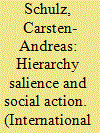

|
|
|
|
|
| Summary/Abstract |
Hierarchy is a persistent feature of international politics. Existing accounts recognize that there are many ways in which actors can stand in relation to one another. Yet they struggle to make sense of this complexity. This study considers Max Weber’s contribution to understanding international hierarchy. It discusses three ideal types of stratification based on the distribution of capabilities (class), estimations of honor and prestige (status), and command relationships (authority). Following the neo-Weberian approach, these dimensions matter because they make social action intelligible. Furthermore, Weber clarifies how class and status are connected and how these two dimensions relate to authority through the process of ‘social closure’. The study concludes that scholars who focus exclusively on authority structures miss the fact that authority typically derives from other forms of stratification: although based on different logics of social stratification, class and status hierarchies often coalesce into (legitimate) authority.
|
|
|
|
|
|
|
|
|
|
|
|
|
|
|
|
| 13 |
ID:
191959
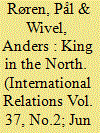

|
|
|
|
|
| Summary/Abstract |
The Scandinavian states’ pursuit of status in world politics is well documented. However, little is known about whether these endeavors have resulted in higher status for these states. In this article, we suggest that the Scandinavian countries represent a useful case to explore whether similar foreign policy profiles and common club membership equalizes or exacerbates the unequal distribution of status recognition in world politics. To measure the status recognition of Sweden, Denmark, and Norway, we use a network centrality measure of diplomatic representation and exchange from 1970 to 2010. We also measure how well the states have performed to increase their status recognition given their available status resources (measured by military capabilities and wealth) and their status-seeking effort (measured by relative diplomatic outreach). Our results show that Sweden has received significantly more recognition and performed much better than both Denmark and Norway in the measured period. We offer three explanations for these developments. First, the spoils of seeking status using the Scandinavian brand is akin to a regional zero-sum game in which Sweden, as the most visible state of the three, is the main beneficiary of the status recognition in the direction of the club. Second, status recognition often lags achievements or increases in status resources because the beliefs of foreign policy practitioners are only updated sporadically. This status lag is especially visible when states struggle to convert their resources into status (Norway), or when they succeed in maintaining their status despite experiencing a drop in status resources (Sweden). Third, an increase in status resources will only influence status recognition if it plays into a corresponding narrative. Sweden, in contrast to the nouveau riche Norwegians, has managed to rearticulate its foreign policy in a way that has attracted recognition in world politics.
|
|
|
|
|
|
|
|
|
|
|
|
|
|
|
|
| 14 |
ID:
178385
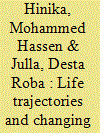

|
|
|
|
|
| Summary/Abstract |
Blacksmithing is one of the oldest traditional technologies among the rural communities of Hararge. Smithing has many functions among which its utilitarian role for agriculturalists clearly stands. This article is basically a survey and adopted historical and ethnographic methods. By collecting qualitative data through interview, focus group discussion, observation and document analysis from seven selected waradas of Hararge, the paper aims to investigate the changing patterns in the status of smiths in terms of their social position in Hararge. It concludes that although smiths were accorded a lowly social position and therefore were not yet considered as equals of the dominant agricultural Oromo in Hararge, the dynamics of social interaction over time have improved the social status of smiths. Smiths and other occupational groups like potters and tanners were treated not as equal partners but as marginalized social groups. This was partly due to the underlying socially constructed origin of the occupational groups which put them below agricultural communities in the social hierarchy and considered them as ‘alien’ and ‘remnants’ of an ancient ‘autochthonic’ population.
|
|
|
|
|
|
|
|
|
|
|
|
|
|
|
|
| 15 |
ID:
096236
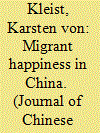

|
|
|
|
|
| Publication |
2010.
|
| Summary/Abstract |
In China, surveys find that migrant households' average happiness (compared with rural households) is lower despite higher income. These findings appear to contradict the standard microeconomic utility function, which predicts that higher income will always result in higher utility. We show that an intuitively plausible modification of the utility function, relating income to status and security utility, preserves standard microeconomic maximization results, and also provides a consistent explanation for the empirical findings on happiness. These results lead to some novel but intuitively plausible implications for economic development in China and elsewhere.
|
|
|
|
|
|
|
|
|
|
|
|
|
|
|
|
| 16 |
ID:
153831
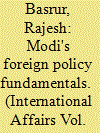

|
|
|
|
|
| Summary/Abstract |
The advent of Narendra Modi as prime minister has produced considerable debate about the direction that Indian foreign policy might take under his stewardship. While there are diverse ways in which one might assess Modi's foreign policy vis-à-vis the major powers, three overarching questions are of central importance. First, given his reputation as a staunch Hindu nationalist, to what extent do his ideological leanings influence Modi's foreign policy, especially with respect to the use of national power? Second, how is Indian policy towards the major powers designed? Are there signs of a classic balance of power approach drawing it towards the US and Japan, and against China? Finally, how is Indian foreign policy configured towards the objective of attaining higher status in the states system? Above all, is Modi significantly different from his predecessors? It is shown that there is no significant shift in the use of power arising from the ‘Hindu’ content in Modi's foreign policy; that his approach to the major powers reflects continuity (with some variations) by way of a focus on strategic partnerships; and that the quest for status is in line with the strategy pursued by previous prime ministers. In sum, there is no substantive change in the trajectory of Indian foreign policy and rising India's future direction is likely to remain both predictable and moderate.
|
|
|
|
|
|
|
|
|
|
|
|
|
|
|
|
| 17 |
ID:
160123
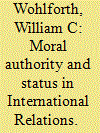

|
|
|
|
|
| Summary/Abstract |
We develop scholarship on status in international politics by focusing on the social dimension of small and middle power status politics. This vantage opens a new window on the widely-discussed strategies social actors may use to maintain and enhance their status, showing how social creativity, mobility, and competition can all be system-supporting under some conditions. We extract lessons for other thorny issues in status research, notably questions concerning when, if ever, status is a good in itself; whether it must be a positional good; and how states measure it.
|
|
|
|
|
|
|
|
|
|
|
|
|
|
|
|
| 18 |
ID:
160056
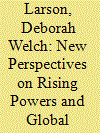

|
|
|
|
|
| Summary/Abstract |
Research on rising powers has made advances in studying new actors, broader questions, conceptualization, and models of world order. Instead of the previous focus on a hegemon and rising power in the power transition literature, scholars are focusing on major and middle powers such as India, Brazil, and Turkey. Instead of a narrow concern with prospects for hegemonic war, researchers are examining the effects of rising powers on global governance and world order. Some scholars argue that rising powers are not trying to overturn the international order, but to establish a parallel order within it. Advances have also been made in conceptualization, such as the important concept of accommodation, transcending the earlier narrow concern with territorial accommodation or appeasement. More work has been done on the concept of clubs such as the BRICS and the G20. Finally, scholars are identifying new, more pluralistic patterns of world order, in which countries specialize in various tasks.
|
|
|
|
|
|
|
|
|
|
|
|
|
|
|
|
| 19 |
ID:
169223
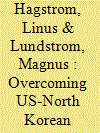

|
|
|
|
|
| Summary/Abstract |
Periods of mutual enmity in US-North Korean relations are typically interrupted by more conciliatory gestures. How can the many twists and turns in this relationship be explained and hopefully overcome so that more long-lasting détente is accomplished? Drawing eclectically on realism and constructivism, we conclude that a nuclear deal should address not only North Korea’s interests in security and regime survival, but also its status concerns. Applying the same theories to the other part of the dyad – the US – we conclude that it may now have material interests in ameliorating the relationship, but that such a development requires US foreign policy discourse to cease depicting North Korea as “irrational” and “evil”.
|
|
|
|
|
|
|
|
|
|
|
|
|
|
|
|
| 20 |
ID:
178475
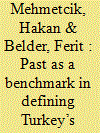

|
|
|
|
|
| Summary/Abstract |
This article deals with Turkey’s status politics since the 2000s, by employing an aspirational constructivist approach that links social psychology with social constructivism in international relations. It focuses on the temporal side of status, stemming from historical identity construction in Turkish foreign policy (TFP) rhetoric and practices under the rule of the Justice and Development Party (JDP) since 2002. Turkey’s status politics is motivated by its past legacies rather than by a peer-to-peer comparison. Therefore, different variances and practices of identity politics in TFP offer valuable insights into its status-seeking practices. The article offers five images of the past that define various role sets and status claims for Turkey.
|
|
|
|
|
|
|
|
|
|
|
|
|
|
|
|
|
|
|
|
|